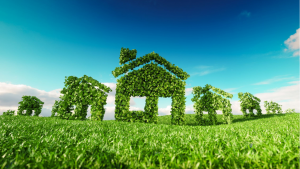
Introduction
The Indian real estate market has witnessed a remarkable shift towards green and sustainable construction in recent years. As the city grapples with the challenges of increasing urbanization and environmental issues, developers and homeowners are increasingly adopting cutting-edge design and construction techniques to build a more sustainable future. This blog delves into the factors driving Bangalore’s growing interest in sustainable architecture, the benefits of these eco-friendly structures, and the initiatives transforming the city’s real estate market.
The Need for Sustainable Development
India’s rapid growth and urbanization have brought numerous benefits, including economic prosperity and employment opportunities. However, this expansion has also resulted in significant environmental challenges, such as increased energy consumption, carbon emissions, and water scarcity. These pressing concerns demand urgent action, and sustainable and green buildings offer a viable solution. By embracing eco-friendly practices and innovative design elements, these buildings minimize their environmental impact while maximizing resource efficiency.
Key Environmental Challenges:
Energy Consumption: High demand for electricity and non-renewable energy sources.
Carbon Emissions: Increased pollution contributing to global warming.
Water Scarcity: Depleting water resources exacerbated by urban sprawl.
Waste Management: Growing volumes of waste requiring efficient disposal methods.
Green and sustainable construction practices address these issues by focusing on energy efficiency, water conservation, indoor air quality, and biodiversity preservation. Bangalore’s real estate sector has the potential to lead the way in building a more resilient and ecologically conscious city by adopting these sustainable development practices. These practices not only benefit the environment but also enhance the health and well-being of the local population, making them a smart choice for a more sustainable future.
The Benefits of Green Building in India
Green buildings offer a multitude of advantages, from environmental sustainability to economic savings and improved occupant health.
- Energy Efficiency:
Green buildings incorporate energy-efficient technologies such as solar panels, efficient HVAC systems, and superior insulation. These measures lead to significant reductions in energy consumption, helping to combat climate change and lower electricity bills for residents and businesses.
- Water Conservation:
Water scarcity is a critical issue in Bangalore. Sustainable buildings address this by integrating rainwater harvesting systems, greywater recycling, and efficient plumbing fixtures. These innovations reduce water consumption and help preserve this vital resource.
- Improved Indoor Air Quality:
Sustainable buildings prioritize the health of their occupants by using non-toxic materials, ensuring proper ventilation, and maximizing natural lighting. This reduces the risk of respiratory illnesses and promotes a healthier living environment.
- Reduced Operational Costs:
While the initial investment in sustainable buildings may be higher, the long-term benefits outweigh the costs.
- Enhanced Property Value:
Green buildings often have higher property values and attract environmentally conscious buyers and tenants, leading to better marketability and potentially higher returns on investment.
Overcoming Adoption Barriers
Despite the clear benefits, there are still hindrances to the complete adoption of green buildings. However, this cost differential has significantly decreased. According to the Indian Green Building Council (IGBC), the initial cost of green buildings, which was 10-12% higher than conventional buildings, has now reduced to just 2-5%.
The Growing Momentum
The potential for green buildings in India is immense. The IGBC predicts that the number of green buildings will rise to 100,000 by 2025, a significant leap from 2001 when there was just one green building in the country. This growth will encompass various sectors, including hospitals, hotels, offices, educational institutions, convention centers, and IT parks.
Bangalore’s Green Initiatives
Bangalore is at the forefront of India’s green building movement, with numerous initiatives aimed at promoting sustainable construction practices.
Key Initiatives:
Green Building Certifications: The IGBC and LEED (Leadership in Energy and Environmental Design) certifications are becoming increasingly common, encouraging builders to adhere to sustainable practices.
Government Incentives: The Karnataka state government offers incentives such as tax rebates and fast-track approvals for green building projects.
Public Awareness Campaigns: Efforts to educate the public about the benefits of sustainable buildings and practices are gaining traction.
Case Studies of Green Buildings in Bangalore
Infosys: The Infosys campus in Bangalore features one of the largest collections of LEED-certified buildings in the world. The campus incorporates energy-efficient technologies, water recycling systems, and extensive green spaces.
Embassy TechVillage: This IT park integrates rainwater harvesting, solar power, and green rooftops to minimize its environmental footprint.
Brigade Gateway: A mixed-use development that includes residential, commercial, and recreational spaces, all designed with sustainability in mind.
The Bigger Picture: Green Initiatives Beyond Buildings
Sustainability in Bangalore extends beyond individual buildings to encompass broader green initiatives, such as:
Green Commute: Promoting the use of electric vehicles, cycling, and public transportation to reduce carbon emissions.
Waste Management: Implementing efficient waste segregation and recycling programs.
Urban Green Spaces: Developing parks, gardens, and green belts to enhance biodiversity and provide recreational areas for residents.
Conclusion
Bangalore’s commitment to sustainable development is paving the way for a greener future. By adopting green building practices and embracing broader environmental initiatives, the city is addressing its most pressing challenges while setting an example for other urban centers. The journey towards sustainability is ongoing, but with continued innovation, investment, and awareness, Bangalore is well on its way to becoming a model of eco-friendly urban development.
Call to Action
As residents, businesses, and policymakers, it is crucial to support and invest in sustainable practices. By prioritizing green buildings and participating in environmental initiatives, we can collectively contribute to a healthier, more sustainable future for Bangalore and beyond.


